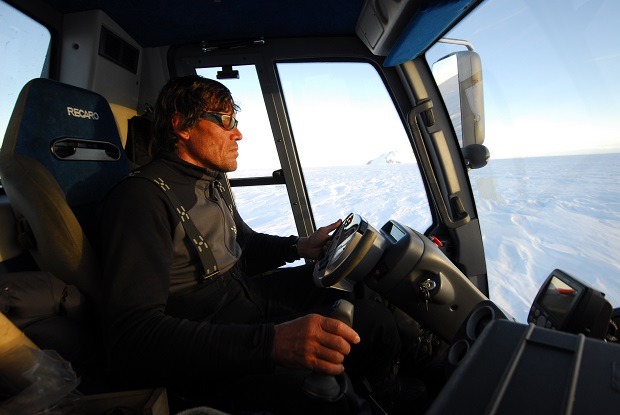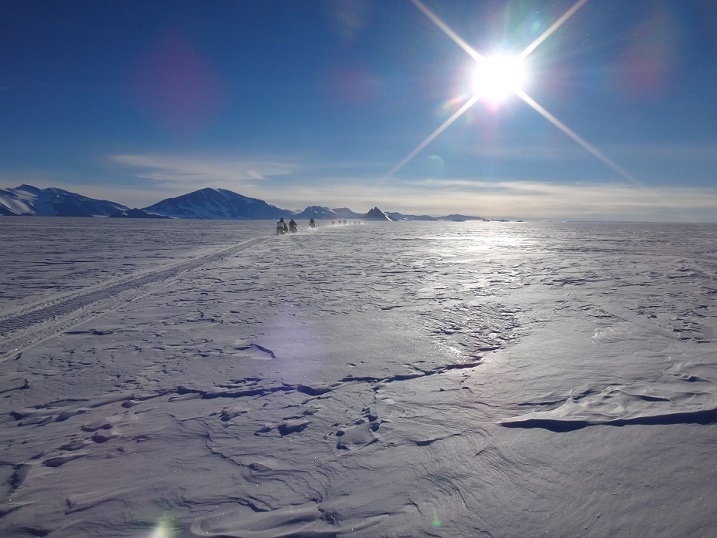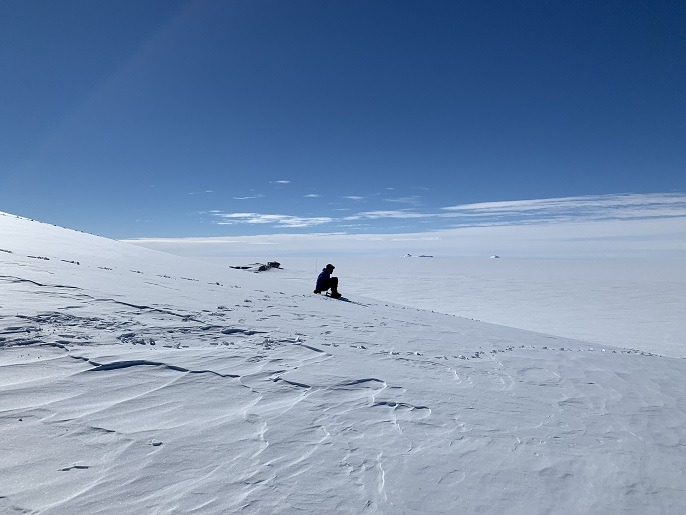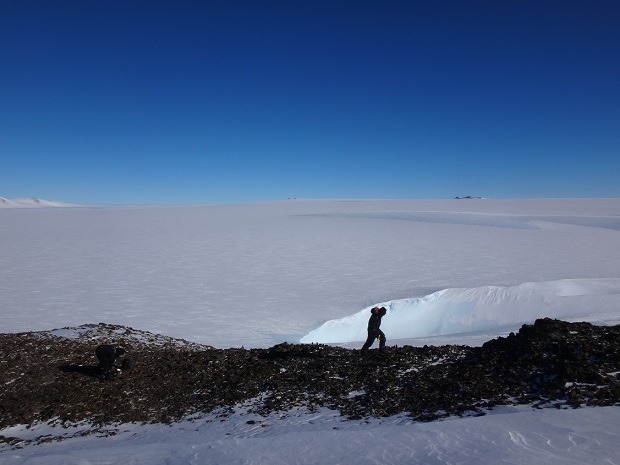A polar explorer and climate change researcher, Alain Hubert divides his time between Antarctica and his native Belgium. In 2002, he founded the International Polar foundation whereby he initiated and directed the construction of the world’s first zero-emission research station in Antarctica. He continues to carry out polar expeditions and also gives speeches around the world. During one of his stays in Brussels, Hubert talked to The Brussels Times about the importance of polar science in understanding climate change, his fascination for Antarctica and what it is like to live in the polar station.
You are the first Belgian to have reached the North Pole in 1994 and you crossed the entire Antarctic continent by yourself in 1998. What drove you to carry out those expeditions?
The two poles have always intrigued me. There is something mythical about them. Although I studied to become an engineer, my passion is mountaineering and I love facing nature. It had always been a dream to reach the North Pole, as it seemed so unreachable. I questioned myself if I really could do it and was excited about the challenge.
The difficulty in carrying out an expedition to the North Pole lies in the fact that the sea ice is constantly moving. Sometimes you can move 20 km in a single night even if you’re sleeping in your tent. This is a factor that you can’t control, and which makes an expedition to the North Pole so much more complicated.

Polar explorer and climate change researcher Alain Hubert founded founded the International Polar Foundation in 2002. © International Polar Foundation
The challenge lies in dealing with this unknown. I remember the moment my friend and I had finally reached the North Pole. We had skied for 76 days and had finally reached our destination, only to find out we weren’t there anymore because the ice had moved us away as soon as we arrived. It was a completely destabilising experience, knowing I wasn’t at the North Pole anymore. I had to keep moving. That was the beginning of my journey as a polar explorer.
You founded a station in East Antarctica in 2009. Who owns the station and who manages it? What is its purpose?
During my expedition through Antarctica in 1998, I had to carry out some scientific measurements, and I discovered what an important role polar science plays in understanding Earth’s climate. I felt that polar science wasn’t getting the attention it deserved in the context of climate change.
On my return to Brussels, the expedition received a lot media attention. I remember walking on the street one day, overhearing a boy shouting to his friend: “Dixie, pull your sledge, pull.” Two little kids were playing polar explorers in the heart of Brussels. Normally when you go on expeditions, you do it for the challenge and your own sense of achievement. But seeing the two boys, inspired by my expedition, caught me. Realising that such an expedition was making people dream of adventure, I decided to do something to share what I had discovered and understood through my expedition, and in particular, the role of polar science in understanding climate change. We set up the International Polar Foundation in 2002 to support polar scientific research for the advancement of knowledge, informed action on climate change and the development of a sustainable society.

© Alain Hubert, International Polar Foundation
Belgium has a long history in Antarctica. The first overwintering expedition in Antarctica was a Belgian expedition in 1897-98. In 1957-58, during the International Geophysical Year, Belgium set up a scientific station there, the King Baudoin Station, which they unfortunately closed two years later.
As this country was one of the twelve founding signatories to the Antarctic Treaty, we thought it was important to return to Antarctica - not only for historical reasons, but also because polar science plays an important role in understanding climate change processes today. The former Belgian station had been operating in a totally isolated part of East Antarctica, so we proposed to the Belgian government to go back to Antarctica and build a research station as a public-private partnership.
During the International Polar Year 2007-09, we would design the station, raise funds for its construction and build it. Afterward, the station would be donated to the Belgian State. And as the station would be completely isolated in a harsh environment, we decided to set up a zero-emission station (one that runs entirely on renewable energy), as an example that one can live sustainably in such a remote place on Earth.
After more than 10 years, it’s still a flagship station, getting the energy it needs from the wind and sun. When you’re at the station, you’re dependent only on the energy that is available. It means you need to adapt your behaviour according to what the battery bank - which is charged by wind turbines and solar energy - can provide. In the end, changing your behaviour according to the energy that’s available is not so difficult, and it doesn’t impact your lifestyle. While the purpose of the station is to support science and give possibilities to scientists from all over the world to carry out their projects, the example the station sends is a valuable one. In a way, it means that if we can live sustainably in such an extreme and harsh environment as Antarctica, we can do it here in Brussels and elsewhere in the world, too.
Could you envision bigger communities of people establishing themselves in Antarctica one day?
No, you can’t grow anything there except in a greenhouse. Antarctica is the only continent without any native human population. You would have to import everything and the transportation is very difficult. Normal ships can’t easily reach Antarctica because of the sea ice surrounding the continent.
Antarctica is a place dedicated to science. Under the 1959 Antarctic Treaty, signed by Belgium and 65 other parties, the continent is dedicated to science and peace. No military activity or exploitation of mineral resources is permitted. The treaty is in force until 2048. At the moment, about 27 nations are active in Antarctica, each running one to five stations, and we collaborate on many research projects.
I notice that more and more tourists are going to Antarctica, and I encourage them to go. It’s good because they get an appreciation of the continent, a better understanding of climate issues and, of course, respect for the sheer force of nature.
Besides research, what else attracts you to Antarctica?
Antarctica is a great mystery to me. When you arrive, you’re struck by a fantastic light, and all you see is a white line on the horizon. After walking for two weeks, you see the same white line. It’s as if you don’t know how to get out. You think you’re totally free, but in fact, you're a prisoner of this environment that doesn’t change, even after months of progress across the ice sheet. I’m totally fascinated by that.

© Sandra Bieler, International Polar Foundation
Once you’re in Antarctica, you basically lose all of your normal sense of orientation. It’s not possible to estimate distances there. In a city, you have a building or a tree as a reference to know where you are and help orient yourself. We get a feeling of security in that sense. In Antarctica, you need to adapt yourself to the environment. It’s a bit disturbing. It’s an environment that’s hard to understand. To me, it remains a mystery and reminds me of how small we humans are next to the forces of nature.
What can you tell about the state of Antarctica? Is it melting?
We set up our station where we did because there was a lack of information and understanding about Antarctica, and what it can tell us about climate change. Since scientists first measured atmospheric CO2 concentrations almost 60 years ago, CO2 concentrations in the planet’s atmosphere have increased dramatically.
From the analysis of Antarctic ice cores, we’re able to see that during the period between a glacial age (cold period) to an interglacial age like today, the concentrations of CO2 rise from 200 ppm (parts per million) to 280 ppm. This had been Earth’s natural climate cycle before significant human influence started. We've been able to collect climate data going back 1 million years in history from ice cores. Since the industrial age began, CO2 concentrations have risen to over 400 ppm. This is a very rapid rate of change, and we have to try to better understand it.
Will the temperature continue to rise? Will the continental ice continue to melt and destabilise the Antarctic and Greenland Ice Sheets, which could, as a consequence, contribute to a significant rise of the sea levels? Will the world's major coastal cities be in danger? What could be the consequences of such rapid change? These are only a few questions that science has to work on, to provide data and mathematical models in order to help society make decisions for creating a more sustainable future.
On the other hand, we know from the analysis of ice cores that this rapid change has an anthropogenic origin related to the burning of fossil fuels. We have to understand that if we’re the cause of it, we're also part of the solution. Reducing fossil fuel consumption involves reconsidering our relationship with energy ‒ a project which will undoubtedly bring new economic and social development for society as a whole, for all countries and their people.
Science is providing some certainties; it is up to society to decide what to do. And this might be the most difficult challenge, as most people haven’t been educated on how to make a change in their behaviour. This is why I’m fascinated by polar research. This is why science and research in Antarctica is so important.
There is a growing will and movement in Belgium and worldwide among private citizens to combat climate change. What message would you give them and to politicians?
Young people are right. We’re not moving fast enough in taking action. We as adults have to take responsibility. There are solutions, we just have to decide to put them on the table and agree on them. A major part entails a transition to more renewable energy, which will result in more locally-focused economies, as it’s not easy to transfer this energy over long distances.
Now that we know that our societies are going through major changes, people are starting to show a better sense of responsibility. But we're still lacking solidarity. I think having a strong sense of solidarity is important. Things are evolving too slowly. We have the Paris Agreement, which is an important step, showing that almost every country around the world is ready to do something and take some responsibility. We also see more initiatives from civil society, such as student protests, and many others. But we can’t ask everyone to change if governments don't have a vision or want to take action. Personally, I’m furious with their cowardice.
We need only to look back a few months, when Belgian politicians discussing climate issues couldn’t agree on an amendment that would have allowed us to pass a law that would oblige future Belgian governments to apply measures to reduce greenhouse gas emissions and combat climate change. It’s a good example of a lack of solidarity. It’s absolutely necessary that politicians - our public servants - take responsibility and serve us, the people. They absolutely need to overcome the self-interest of their own mandates. But unfortunately, most of them won’t.
By Boré Kedober

